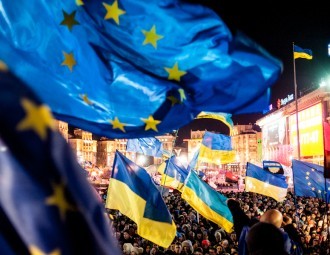Ulad Vialichka: Responsibility for Ukraine’s fate is no longer in corporate or individual property

Ukrainian society no longer wants to play the role of a statistician – responsibility for the country is divided between those who consider themselves citizens.
The Central Election Commission is now finishing to process the official voting returns from polling stations in the early elections to the Verkhovna Rada. With the vote almost completed, six parties are certain to have won seats in parliament: the Popular Front with 22.16% of the vote, the Bloc of Petro Poroshenko with 21.82%, Samopomich with 10.99%, the Opposition Bloc with 9.40%, the Radical Party with 7.44%, and Batkivshyna with 5.68%.
There are a lot of non-politicians among those who will soon get parliamentary mandates – Maidan participants, journalists, ATO partakers, members of non-governmental organizations, who have become famous within this year.
- It is obvious and clear that the role and status of civil society representatives is now much higher in comparison with the situation in the beginning of 2014, - Ulad Vialichka, the head of the International Consortium “EuroBelarus”, said in the interview with “EuroBelarus” Information Service. – And it is clear from the membership of the blocs that decided to take part in the elections to the Verkhovna Rada. They are now cannot be defined as political, as they are closely related to personalities many of whom became famous, popular, or trustworthy due to their active civic activity during the events of the last year in Ukraine. Besides, we see people from all different Ukrainian cities. Citizens in Ukraine are in high demand; and it is obvious for me that these elections to the Verkhovna Rada are elections among society, not among politicians.
However, Vialichka noted, it is still a question “whether civil leaders will be able to turn into politicians, how they will be able to play the role of political players in such difficult situation and in such complicated structure as the Verkhovna Rada”.
- Still, these people don’t have any particular experience in backstage political struggle. However, these people believe in their goals, have certain values, and go into the Rada because they know what they are fighting for and what they stand for. Thus, Rada is about to experience very interesting times where different attitudes towards the system of values will meet – bureaucratic and civic. But now it seems to me that civicism dominates in Ukraine in all spheres of life, including the latest elections to Rada.
Ulad Vialichka is convinced that after ten years since the Orange Revolution happened the active part of Ukrainian society has made necessary conclusions.
- I think that Ukrainians have already drawn this parallel and said themselves with certainty: “In 2004 we achieved victory but gave it up to politicians, saying them to do well”, and now there are no illusions regarding that. Today in ten years society isn’t ready to give victory to politicians; society will control them and ask them all the time whether they do what they promised to do and what they were elected for. It is the society that has changed, and the role of politicians in today’s Ukraine is fundamentally different – they are accountable to society. I think that the main change that happened in the Ukrainian society is the revolution of conscience. Ukrainians are not ready to give responsibility for the country to someone else, however strong, clean, and whatever else they are. Responsibility for Ukraine’s fate can no longer be in corporate or individual property; it is divided between those who regard themselves to be citizens.
-
03.01
-
07.10
-
22.09
-
17.08
-
12.08
-
30.09










































